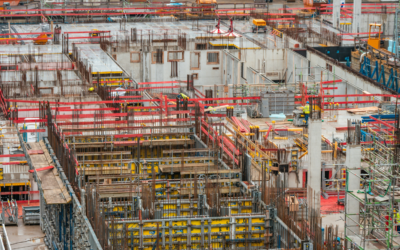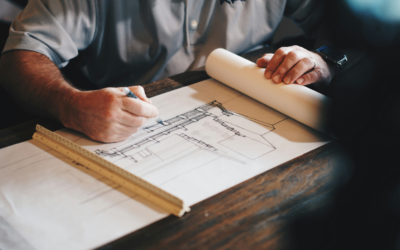The commercial construction industry encompasses the art and science of designing, building, and managing buildings that serve a business purpose. It ranges from small, independent retail stores to large, skyscraper office buildings and everything in between.
Navigating the intricacies of commercial construction can be daunting, particularly for those venturing into this realm for the first time. However, there’s no need to feel overwhelmed. This article is designed to demystify the process by dissecting the key elements of commercial construction, ensuring you are well-equipped to understand and engage with each phase of your project.

Types of Commercial Construction
Commercial construction encompasses a diverse range of structures, each tailored to the unique needs of the sector it serves. Retail buildings, such as shopping centers and standalone shops, are designed to showcase products attractively, facilitate easy customer movement, and create a pleasant shopping atmosphere.
Hospitality structures, including hotels and restaurants, prioritize guest comfort and convenience, often featuring amenities like well-appointed rooms, leisure facilities, and high-standard eateries. Industrial structures like factories and warehouses provide functional spaces for manufacturing, storage, and distribution, with features such as high ceilings, large doors for loading and unloading, and durable floors to withstand heavy machinery.
Office buildings, on the other hand, focus on creating productive work environments with spaces for collaboration, individual work, and client interactions. Healthcare facilities such as hospitals require highly specialized spaces like operating rooms, patient wards, and diagnostic areas, all designed to ensure patient safety and facilitate efficient healthcare delivery.
Institutional buildings, including schools and universities, have unique needs such as classrooms for instruction, laboratories for practical experiments, libraries for research, and auditoriums for larger gatherings. Government buildings, finally, serve a variety of functions from administrative work to public services, and their design often reflects both the dignity of the state and the need for accessible public spaces. All these structures underpin the diverse needs of the commercial construction sector, each carefully tailored to the specific requirements of its respective industry.

Levels of Commercial Construction | Small-Scale Projects
Commercial construction projects vary greatly in scope and complexity, and can generally be divided into two categories: small-scale and large-scale. Small-scale projects often involve fit-outs of office spaces, remodeling existing structures, or tenant improvement projects like renovating outdated facilities.
These endeavors require a meticulous eye for detail, particularly when they involve the integration of modern technology or efficient design into an existing space. In these smaller projects, the challenge is often to maximize utility and aesthetics within a limited space, all while adhering to budget constraints.

Large-Scale Projects
On the other hand, large-scale commercial projects typically encompass grand structures like skyscrapers, multi-level shopping malls, or expansive educational campuses. These projects demand comprehensive planning and sophisticated construction techniques due to their sheer size and complexity. They often involve numerous stakeholders, from architects and engineers to contractors and regulatory authorities.
Large-scale construction projects also have a significant impact on the surrounding landscape and community, and hence, they usually undergo rigorous environmental and social impact assessments. Despite the challenges they present, successful large-scale projects have the ability to transform cityscapes, stimulate economic growth, and create spaces that thousands of people interact with daily.

Commercial Construction Bidding Process
The commercial construction bidding process can be both complex and challenging. It involves a set of well-defined procedures designed to determine which contractor is most suitable for a particular project. The process typically includes submitting a proposal, completing pre-qualification requirements, attending a pre-bid conference, and preparing and submitting a bid package.
Given that commercial construction projects often involve large sums of money and require close attention to detail, it is crucial that contractors approach the bidding process in a systematic and thorough manner. By doing so, they can ensure that they are well-positioned to win contracts, reduce the risk of costly mistakes, and ultimately, deliver a successful project to their client.

Attain a Certificate of Occupancy
A Certificate of Occupancy (C of O) is a key document in the final stages of a commercial construction project. It serves as official proof that the building complies with all the structural, safety, and health regulations outlined by the local government. The C of O is crucial in ensuring that the building has been constructed to maintain a safe and healthy environment for its occupants.
Acquiring a C of O involves a comprehensive inspection process by appointed municipal officials. This process investigates all aspects of the building – from its structural integrity and fire safety measures to its adherence to local zoning laws and health regulations. The inspectors scrutinize the building’s mechanical systems, electrical wiring, plumbing, accessibility features, and more. Additionally, they verify that the property aligns with the proposed use specified in the building permit application.
Commercial buildings without a C of O are deemed illegal and cannot operate. This implies that businesses cannot open, leases cannot be signed, and the building cannot be sold until the certificate is issued. Furthermore, failure to secure a C of O can lead to penalties, legal ramifications, or even closure of the building.
In essence, if you’re planning a commercial construction venture, understanding the significance of a C of O and the process to obtain it should be a priority. This not only ensures your building’s compliance with local laws but also safeguards the well-being of its occupants, thereby contributing to the project’s overall success.

The Importance of OSHA Compliance in Commercial Construction Projects
Commercial construction projects are an essential part of our economy, providing new structures for businesses and communities. However, these projects come with inherent risks that demand strict adherence to safety regulations. That’s where OSHA compliance comes in. The Occupational Safety and Health Administration sets guidelines for commercial construction sites, ensuring that workers are protected from hazards such as falls, electrical shocks, and dangerous machinery.
Every commercial construction project in the United States must comply with OSHA regulations to protect the safety of workers and pass inspection. Failure to comply can result in serious consequences, both for the workers and the company overseeing the project. By prioritizing OSHA compliance, companies can avoid potentially life-threatening accidents and reduce the risk of costly legal liabilities. It’s simply good business practice to put safety first in commercial construction projects. To learn more about OSHA violations, visit our previous blog.

How is Commercial Construction Different from Residential Construction?
Commercial construction is different from residential construction projects in numerous ways. Commercial properties are constructed to meet specific business needs while residential buildings are constructed for personal use.
The commercial building’s complexity, size, and functionality are also much greater than residential structures. The equipment and building materials used in commercial construction are commercial-grade, while residential construction deals with more traditional materials.

Conclusion
Commercial construction projects span a wide spectrum, from modest undertakings like office renovations to monumental tasks such as erecting skyscrapers. Each step of these projects necessitates a distinct combination of skills, resources, and management strategies to ensure the efficient and successful completion. One vital stage in this process is the bidding phase, where various construction firms vie against each other to provide the most cost-effective quote for the project. They base their estimates on the detailed building plans and specifications provided. This phase is instrumental not just in ensuring budgetary efficiency, but also in securing reliable and competent contractors to bring the project to fruition.
Compliance with the Occupational Safety and Health Administration (OSHA) regulations is another essential aspect of commercial construction. Ensuring the safety of construction workers and the general public, OSHA regulations set forth standards for construction sites to minimize accidents and promote safe work practices. Violating these rules can result in severe penalties, legal trouble, and potential project delays.
In conclusion, commercial construction is a complex process with multiple phases and considerations, including the bidding process and OSHA compliance. If you need assistance during your commercial construction project, consider South Coast Improvement Company.
About South Coast Improvement Company
In the realm of commercial construction design and management, South Coast Improvement Company has earned its reputation as a distinguished leader. Our areas of specialization span across assisted living, senior living, healthcare, and educational sectors, showcasing our expertise in both interior and exterior development.
Our portfolio is replete with a multitude of projects, including office buildings, healthcare facilities, educational institutions, and various commercial spaces. Our high-quality commercial construction services include: conceptual development, design & engineering, construction, general contracting, project management, renovations, add-on construction, interior/exterior finishing & painting, carpentry services, custom millwork/cabinetry, and conceptual design services.
Our commercial construction team excels in executing projects within occupied establishments, deploying superior construction standards to ensure the safety and welfare of all involved. We take pride in our well-rounded team, competent across various markets and equipped with a profound understanding of the subcontractor landscape, legalities, and other critical aspects of the industry.
We offer a wide array of comprehensive construction services to take your next commercial building endeavor to the next level. Reach out to us today to see how we can assist you with your next commercial construction project.
View Our Work
Aspen Dental
Partnering with The Aspen Group on the construction of a new Aspen Dental facility that’s functional & welcoming for patients & staff alike. South Coast Improvement Company was awarded the construction of a new Aspen Dental facility in Killingly, CT. The...
Springhouse Senior Living – HumanGood
Designed to enhance comfort & functionality. South Coast Improvement company was hired by HumanGood for an interior and exterior renovation at Springhouse Senior Living. Our skilled teamtransformed the 2nd through 5th floor common areas into brighter, more...






